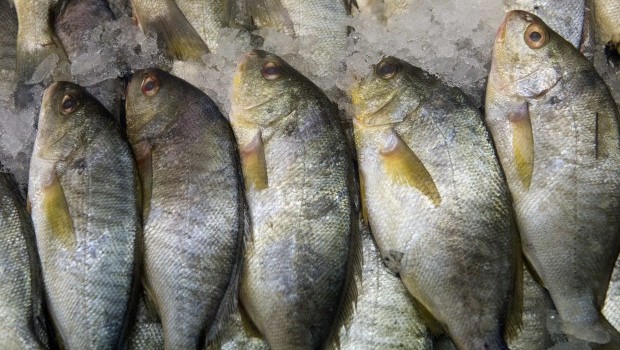
Fresh fish is displayed for sale in this August 6, 2013, file photo. Egyptian fish food producers are among the businesses experiencing growth during this period of economic turbulence. (AFP PHOTO/Saul LOEB)
Against a background of unrest, access to credit and foreign currency has dried up. Government officials have stopped taking decisions and security has all but disappeared from the streets.
Factories and workshops have been hit by interruptions in subsidized diesel and gasoline and by regular power outages as the government runs low on the dollars it needs to import petroleum products from abroad.
Angry workers routinely shut down plants and block ports.
Gross domestic product grew at an annualized rate of just 2.3 percent in the nine months to end-March, well below the 6 percent a year thought necessary to absorb new entrants to the labor force.
But for many in the food production, building supply and other businesses, even though the economy may have slowed, people keep demanding services.
“Last year we had in sales volume terms and in value terms our best-ever year in the Egyptian market, and this year will be even better,” said Taher Gargour, managing director of sanitary ware and tile-maker Lecico Egypt.
“We’re selling more at higher prices than we’ve done in any year, even the best years of the Mubarak economy when overall GDP growth was at its peak.”
At a time when mainstream contractors were suffering for lack of business, Lecico has been supplying toilets and tiles to small and individual builders who were taking advantage of a breakdown in government zoning rules.
Across the country, skylines have turned brick-red as people add illegal floors and build concrete and fired-brick buildings on agricultural and other restricted land.
The building boom has also been driven by Egypt’s bulge of young adults at marriage age seeking a place to live.
“The other story is that given uncertainties about the economy and the strength of the Egyptian pound, people are moving to real estate as a sort of safe haven investment,” Gargour said.
Lecico’s net profit jumped 28 percent year-on-year to 16.3 million Egyptian pounds in the first quarter of 2013, while revenue climbed 15 percent to 331.9 million pounds.
Feeding the Fish
Hussien Mansour, chief executive of Aller Aqua Egypt, a maker of extruded feed pellets for fish farms, says the business environment has become insufferable.
“Egypt’s currency problem makes it harder to import,” Mansour said. “The diesel shortage is hurting production. Wages are rising and security on roads has become a problem.”
As the government borrows to finance a steadily growing budget deficit, private borrowers are being crowded out.
Banks are giving fewer loans, demanding more rigorous guarantees and setting more conditions. They now typically charge 18 percent interest on loans, plus administrative costs and fees, Mansour said.
The lack of access to credit means businesses have to prepay with cash, which ties up capital and is painful for companies whose products have an expiry date.
“The collection time that used to take a week can now take two months. This is affecting very big companies as well as small companies,” he said.
Yet this hasn’t stopped Aller Aqua, an Egyptian–Danish partnership, from taking advantage of the economic downturn to build a new factory in Sixth of October City west of Cairo.
“Lots of contractors are suffering because the market is bad. Many have suspended operations,” Mansour said.
Egypt is a world leader in tilapia farming, mostly on the Nile Delta, where fish are typically reared in flooded rice fields. Aller Aqua’s 40 permanent staff and 40 temporary workers use imported soy, corn, fish meal and other raw materials to produce 20 percent of the country’s extruded fish feed.
The factory will triple the company’s capacity, making it the biggest extruded feed maker in Egypt’s rapidly growing market, Mansour said.
Red Tape
Hammam Elabd, chief executive of Western Mechatronics, a maker of industrial scales, conveyor belts and other factory products, also says credit has been a concern.
Before the 2011 uprising, smaller companies were rarely asked to provide letters of guarantee when buying goods on installment, but now it is standard. And before, the bank would typically demand a down payment of 30 to 40 percent. Now they are asking for 100 percent, Elabd said.
“The impact has been tremendous. Sales have gone down, expenses have gone up, and financing of the basic things that you buy and sell has been a problem,” he said.
This has cut into Elabd’s sales, but he has found an alternative to the home market.
“If not for our contracts outside Egypt it would have been worse,” said Elabd, who said he had turned in particular to the market in Libya.
The foreign sales have helped Elabd skirt the problem of foreign currency for imports that has hurt many other companies.
The government tightened access to foreign currency after a run on the pound in December, with priority given to importers of commodities defined as essential, such as basic foods.
But even importers of these commodities who were eligible for currency at the official rate have had to buy some of their currency on the black market, said Mansour of Aqua Aller.
Even then banks keep demanding new documents.
“Companies must provide customs documents to banks. Companies are allowed to withdraw a maximum $30,000 a day, so it can take two weeks or more to complete a sizeable import purchase,” Mansour said.
“We have problems convincing foreign investors to work with us or to finance what we import from them or to allow us to pay later in installments—they all demand up-front payments for anything they would export here,” Elabd said.

Trackbacks/Pingbacks